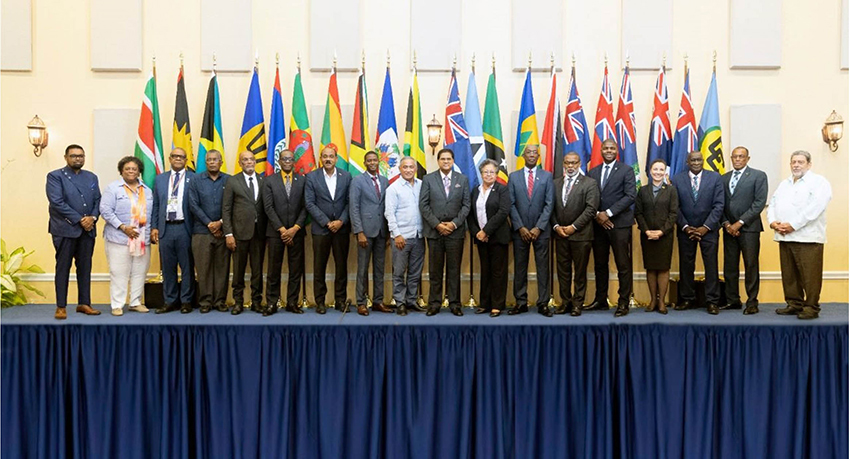
The Opening Ceremony was addressed by the Chair of Conference His Excellency Chandrikapersad Santokhi, outgoing Chair Honourable John Briceño; Prime Minister of The Bahamas, Honourable Philip Davis; Prime Minister of Grenada, Honourable Dickon Mitchell; Prime Minister of Saint Lucia, Honourable Philip Pierre; Secretary-General of the Caribbean Community, Her Excellency Carla Barnett, and the Secretary-General of the United Nations, His Excellency António Guterres.
Secretary-General Barnett underscored the need for the work of the Community to make a difference in the lives of its citizens. She said that the Conference was meeting at a time of severe global crisis in three vital areas, namely, food, energy, and finance.
“Addressing solutions for our Region requires collective intellect and will to act together. This task is not beyond us, as we have proven time and again. Let us, therefore, once more unto the breach and make a difference in the lives of our people,” Secretary-General Barnett added.
The United Nations Secretary-General said the meeting came at a moment of maximum peril for people and planet alike. He noted that CARICOM Member States were victims of the myth that middle-income countries did not need concessional financial support – a need that completely disregarded vulnerability to external shocks.
He pointed to three areas of concern for consideration. He identified climate action that matches the scale and urgency of the crisis; reform of the morally bankrupt global financial system and the fight against the COVID-19 pandemic.
The Prime Minister of The Bahamas said it was striking that so many of the Community’s most urgent struggles derived in great part from external causes. He noted that although responsibility for making the individual countries stronger and more resilient to the impact of external events lay within each government, the history of the Region made it clear that “we can have a greater impact if we also join forces and stand together.”
“Too many times, our countries have acquiesced to the pressures of larger, more developed states. Their approach of divide and conquer has hurt us all,” he added. “The scaffolding for our regional architecture –the scaffolding for our future — is in our hands,” he said.
The Prime Minister of Grenada noted that July 4th marked the 49th anniversary of the signing of the Treaty of Chaguaramas and provided an opportune time to pause and reflect on the many experiences in pursuit of regional integration. “Over the last 49 years, we have had many moments of celebration coupled with moments that required solemn reflection, still all the while envisioning the future,” he said.
The Prime Minister said he was excited and fully on board with the CARICOM 25% by 2025 Food Import bill Reduction strategy. “We must however transition to the next generation, along with new technologies and knowledge application to enhance agriculture production,” the Prime Minister said.
He said now was a time for all the young people across the Caribbean Community. “This is your moment, where it is a Time for Action and a Time of Choosing,” he said.
Prime Minister of Saint Lucia stated that the Russia-Ukraine war had left the entire world suffering from rising inflation, making life for most households very difficult, more so for the people of the region who were still reeling from the effects of the COVID-19 Pandemic, which brought with it business closures, loss productivity, reduced tourism arrivals and the reduction in government revenues.
“The demands on our public health system, which we shouldered to keep our people safe and the provision of social protection and support measures for vulnerable citizens have left governments of the region with very little fiscal space to move ahead to grow their respective economies,” he added.
The Prime Minister said that despite those dangerous winds, Saint Lucia’s faith in CARICOM remained strong and unshaken and continued to believe in the potential strength and protective shelter that CARICOM could provide.
The Prime Minister of Belize noted that the Community should be proud that it had been able to effectively exert strong and influential leadership at the global level. He said CARICOM’s leadership on climate and on access to finance was starting to bear fruit.
“We have a standing invitation from the G20 Presidency of Indonesia to participate in their work, which is now extended to Suriname as the Incoming Chair. The IMF’s new Resilience and Sustainability Trust — not without its imperfections— is a direct response to our advocacy. The finalisation of the multidimensional vulnerability index is within sight,” he said.
Chair of Conference, the President of Suriname said we found ourselves at a crossroads and it was the moment, to re-assess, refocus and recommit our endeavours, to ensure sustainable development and prosperity, for the people of the Region, ultimately aimed, at leaving no one behind.
“But we require leadership and willingness, to go for broad cooperation. To go for a creative approach. To go for innovation in our approach, for new strategies. To go, for private sector involvement. To go, for the participation of the youth,” the Chair stated.
He proposed the establishment of a CARICOM Private Equity Fund, to support CARICOM Enterprises and the facilitation of Partners, to set up private equity and debt funds, in the Region, to bolster employment and growth.













